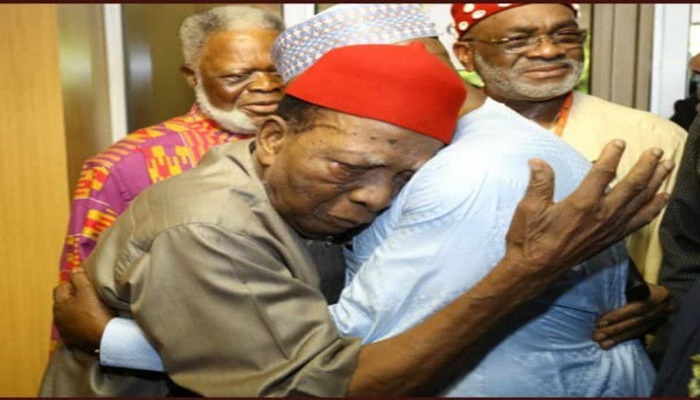
The presidential candidate of the People’s Democratic Party (PDP), Atiku Abubakar, has beefed up his legal team by obtaining the services of foremost constitutional lawyer, Professor Ben Nwabueze SAN, to prosecute his petition challenging the victory of President Muhammadu Buhari at the February 23 election before the election tribunal.
Nwabueze made his first appearance at the presidential election tribunal on Thursday where Atiku and his political platform, the PDP, opened their case by tendering a total of 3, 465 exhibits made up of result sheets from the 25 local government areas of Niger State.
The documents were admitted as exhibits by the tribunal albeit with objections from the Independent National Electoral Commission (INEC), President Buhari and the All Progressives Congress (APC) forms EC8A, EC8B, and EC8C respectively.
While forms EC8A contains results of the presidential election from polling units forms EC8B and EC8C are results of the election from wards and local government areas of Niger State.
Also admitted in evidence was a receipt issued to the petitioners by INEC in respect of the tendered election materials, which was marked as Exhibit 3465 by the tribunal.
The documents were admitted amid objections from counsel to the respondents who told the tribunal that they would adduce reasons for their objections at the address stage of the petition.
The tribunal chairman, Justice Mohammed, Lawal Garba, who admitted the results as exhibits told lawyers, INEC, Buhari and APC to defer their objection to the point of address to the tribunal as earlier agreed by parties during the pre-hearing session.
Earlier in the day, Prof. Nwabueze (SAN) announced his appearance for the petitioners but left shortly afterward.
He, however, told the tribunal that he was leaving the proceedings in the hands of Dr. Livy Ozougwu (SAN) with other lawyers in the legal team.
He, however, left the tribunal with a copy of his prepared address dated July 4, 2019.
In the said speech, the professor of law lent his voice to the claims that the last presidential election was flawed and that remedy must be found if democracy is to flourish.
He prayed the tribunal to allow him to use his wheelchair due to his age and health situation.
Nwabueze’s two-page statement read in part: “The February/March 2019 general election has come and gone, but the generality of Nigerians seem to agree that something was wrong with them, particularly the February presidential election.
“They suspect that the later was manipulated or, in more familiar language, rigged.
“What is not known is how or by whom the rigging was done. An election tribunal/court is now saddled with the task, an intractable task, of finding out the truth about what happened.
“The task before it is made intractable by what Justice Kishna Iyer of the Indian Supreme Court referred to as “the tyranny of procedure, the horror of the doctrine of precedent, with its stifling and deadening insistence on uniformity, and the booby traps of pleadings.
“The decided election cases show the election tribunal/court to have succumbed all too readily to these constraining factors, but Nigerians still expect it to rise above the self-imposed shackles in order to find out the truth about what happened during that election.
“The tribunal/court owes it as a duty to the country to do so, as the discovery of the truth will help to set us free from the scourge of electoral malpractices.
“As the Court of Appeal and the Supreme Court have stated in several cases, election petitions are sui generis proceedings, established, not for the purpose of adjudicating disputes arising in dealings or transactions between individual persons, but for the purpose of enabling the political community to choose, in free and fair election, persons to manage public affairs on its behalf and for the benefit of all its members, which makes largely inappropriate the technicalities of the law of pleadings and evidence applicable in ordinary cases between individual persons.
“An election petition is not such ordinary case; it is sui generis, to which the technicalities of the law of pleadings and evidence may not be appropriate.
“And the Judicial Committee of the Privy Council has said that a tribunal is not deprived of the character of a court or its decisions the character of judicial decisions simply because of it is empowered by statue to decide as it thinks just and equitable or according to equity and good conscience, in as much as the effect of such a power given to a court is not to exonerate it from all rules of law: Peacock v. Newton Marrickville and General Co-operative Building Society No. 4 Ltd (1943) 67 CLR 25.
“An approach based on law but moderated by what is just and equitable in the interest of peace, security and good governance of the community is what is needed in election cases, not a rigid adherence to the technicalities of the law of pleadings and evidence and the doctrine of precedent.”
At the end of the speech, the law professor announced that Dr. Levy Uzoukwu SAN, would take charge of Thursday’s proceedings.
Meantime, proceedings are ongoing with the tendering of result sheets from Yobe and Jigawa states.
The petitioners had flooded the tribunal, with boxes of electoral materials in which they intend to lead evidence. The states include Niger, Yobe, Kebbi, Jigawa.
-The S






